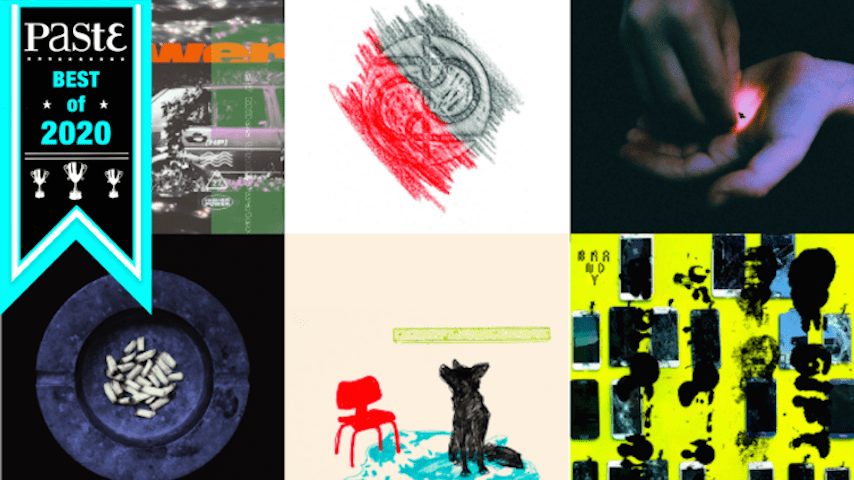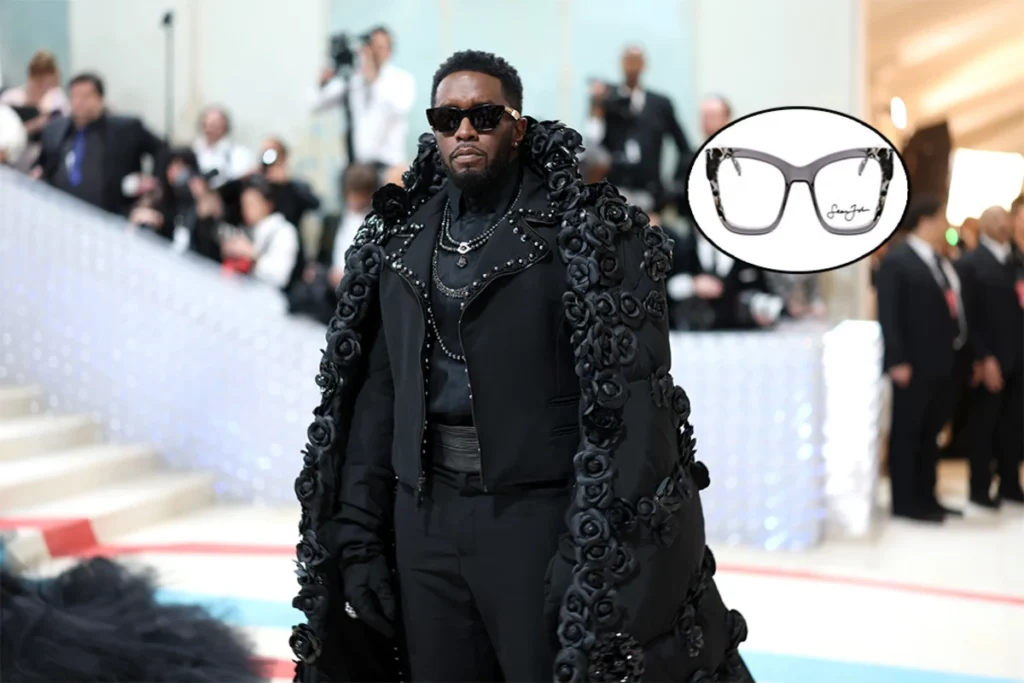We’re still trying to get 2020 out of our mind, but here are a few things we think you should keep from last year. Whether it was Bambara’s spine-tingling post-punk short stories about murderous outlaws in Georgia, Crack Cloud’s oddball, theatrical tales about a world coming apart at the seams or Chubby and the Gang’s raucous hardcore-pop tunes about getting up to no good in working class London, punk kept us thoroughly entertained in 2020. From noise-punk and hardcore to folk-punk and post-punk, here are 25 of our favorite punk records from 2020.
Adulkt Life: Book of Curses
London band Adulkt Life exude an untamed urgency that’s hard to capture. This newly formed, multigenerational band (featuring Chris Rowley of riot grrrl band Huggy Bear and John Arthur of Male Bonding) released their debut album Book of Curses, which overflows with noise-punk of the eccentric, bombastic variety. It’s ruthlessly wired and endlessly fun, with hints of jazz and hardcore lurking beneath the surface. Their atmospheric, offbeat moments blend seamlessly with fits of barreling punk, and Rowley’s shouty, gut-punching vocals affirm that a band fronted by someone in their mid-50s can be just as wildly exciting to listen to as an outfit several decades their junior. —Lizzie Manno
Bambara: Stray
Athens, Ga.-via-Brooklyn band Bambara employ fictional, character-based storytelling in their lyrics, and the humanity that each of us craves is just as prevalent in their non-autobiographical writing. Bambara arrived in 2013 with their debut LP Dreamviolence, a lo-fi smoke bomb of noise punk where frontman Reid Bateh first wet his feet with this kind of songwriting. The songs were only loosely tied together, especially in comparison to their recent work, but dark descriptions like “stained teeth on the floor” and a man “shaped just like a dog” were already present. By 2018’s Shadow on Everything, Bambara were constructing post-punk songs like chapters of gothic literature, each serving a wider concept. Their newest effort Stray sees them pushing even further. With inspiration from Bateh’s Georgia upbringing and a stack of thrift store photographs, the Bambara singer isolated himself for a month to write their new album. While Shadow on Everything placed Bateh in the story with events unfolding chronologically, Stray is more ambitious with third-person narratives and shuffled timelines snaking in and out of each other. —Lizzie Manno
Brandy: The Gift of Repetition
After their scratchy 2018 debut Laugh Track, New York punk outfit Brandy returned with The Gift of Repetition. It’s much cleaner and tighter than its predecessor, lending more space for their punchy vocals, but their sheer rhythmic power is still Brandy’s main focus. If that’s not enough to win you over, they also lend gang vocals in a zany delivery, which turn these songs into communal, contagious bursts of energy. Their humor and pop prowess are also selling points, particularly with the bratty, tongue-in-cheek, hardcore-referencing opener “(Wish You Was) Madball Baby.” You’ll have no choice but to throw yourself headfirst into the middle of the action. —Lizzie Manno
CB Radio Gorgeous: EP
Chicago punk supergroup CB Radio Gorgeous, which features members of CCTV, Forced into Femininity and Negative Scanner, released a tape a few years ago via Not Normal Records, and recently, they followed it up with their vinyl debut. This four-track, seven-inch release, simply titled EP, is seven-and-a-half minutes of thrashing, take-no-shit punk. With tinges of classic American hardcore and ’70s punk, this EP is a volcano of snotty attitude, but strong pop fundamentals and sharp production underpin it all. In case you didn’t know hardcore punk could sound stylish and spunky, here’s CB Radio Gorgeous. —Lizzie Manno
Chubby and The Gang: Speed Kills
Chubby and The Gang’s debut LP, Speed Kills, was released via independent British hardcore label Static Shock back in January, and critics raved about it, coming to a similar consensus that its hopped-up punk-pop is impossibly punchy and ridiculously fun. Charlie Manning-Walker and his fellow band mates are all hardcore veterans—having played in bands like Violent Reaction, Abolition, Guidance and Gutter Knife—but somehow they’ve made one of the strongest stitchings of pub rock, classic pop, surf and punk in recent memory. “Chubby and The Gang Rule OK?” is both a statement of fact and their unruly lead album track that takes about 30 seconds to convince you that their breakneck rhythms and pop chops are the real deal. Like their colorful, cartoonish album cover, the album celebrates the vast characters of working-class London: the dubious, fun-loving rascals, the crass authority figures, the squares and the reckless brutes. But more than anything, Speed Kills is an ode to the “gang,” the fiercely loyal one that finds you when you’re young and makes grim circumstances much more bearable. —Lizzie Manno
Coriky: Coriky
For a long time, Coriky wasn’t so much a band as it was a myth. Formed in 2015 by guitarist Ian MacKaye and bassist Joe Lally—both of revered D.C. post-punk giants Fugazi—as well as drummer Amy Farina, the trio existed only in private for three years, played one low-profile benefit show in 2018, and remained unnamed until early 2020. Their self-titled debut album is a revelation, fusing Lally’s familiar dub-influenced bass lines and Farina’s restless rhythms with an unabashed interest in vocal melodies that separates Coriky from Fugazi. As long as the former is making music like this, the latter can stay on extended hiatus. —Ben Salmon
Crack Cloud: Pain Olympics
Pain Olympics rails against not just failed states, but failed societies, and instead Crack Cloud builds their own altruistic, anarchistic support system for each other. The Vancouver DIY collective dips into ‘70s punk and funky new wave to tell stories of struggle, war and addiction that arise when institutions let us down. Their seemingly infinite amount of moods—sterile, theatrical, sassy, fuming and benevolent—bring their characters and shared vision to life, and it won’t take long for listeners to buy in. —Lizzie Manno
Dogleg: Melee
As song titles go, “Kawasaki Backflip” rolls off the tongue quite nicely. It has a certain rhythm—you can imagine it as a punchline delivered by Will Ferrell’s George W. Bush. Somehow, it evokes a carefree thrill and a display of skill, both at the same time. Perhaps it’s no coincidence, then, that those descriptors can also be applied to “Kawasaki Backflip,” the opening track on Detroit rock quartet Dogleg’s debut album. A powder keg packed into just under two and a half minutes, the song is a bundle of heavy artillery snare cracks, buzzsaw guitars and singer Alex Stoitsiadis’ demolition dreams, delivered with a perfect balance of throat-shredding desperation and melodic know-how. More or less, those sonic qualities course through Melee’s 10 tracks, and they’re the reason Dogleg has built considerable buzz within the punk and emo communities. Formed in 2016, the band is brawny enough for the former and catchy enough for the latter, walking a line previously mastered by bands like ’90s Midwestern heroes Braid or more recent emo-revival flagship The Hotelier. At this point in their career, at least, Dogleg go faster than both those bands. In fact, they very rarely reach for the brake pedal on Melee, choosing instead to approach a thrash pace on standout songs like “Fox,” where drummer Parker Grissom and bassist Chase Macinski establish themselves as solid, speedy foundation-layers and a group of 11 people expertly provide backing gang-vocals. —Ben Salmon
Erik Nervous & The Beta Blockers: Erik Nervous & The Beta Blockers
All hail the American Midwest, where a combination of chilly weather, bedroom boredom, big-city proximity and industrial fumes turns out some of the weirdest of the weird punks. To wit: Erik “Nervous” Hart, who is a future minor legend in these parts thanks to his healthy DIY streak and his Devo devotion. On their self-titled LP, he’s backed by rhythm-section rock duo the Beta Blockers, who beef up his buzzsaw punk and give Nervous room to explore new wave synths (“Blasted Heath”) and saxophone grooves (Siouxsie and the Banshees cover “Make Up to Break Up”). In between, the album is single-minded in its pursuit of perfectly sharp-cornered shredding. —Ben Salmon
FACS: Void Moments
The new FACS album sounds like it warped in the sun, which is ironic, because it’s impossible to imagine listening to it outdoors in the daytime. Void Moments is another entry in the recent wave of gothy post-punk exhumations, but one that doesn’t get tripped up on the past—perhaps because it’s made by seasoned vets with clear goals and ambitions. You can tell they’re familiar with PiL, Wire, Liars and all manner of other bands that take a dark, droning, dubby approach to rock-ishness, but don’t try to be anything other than FACS. This is plodding, sputtering, arrhythmic robot rock with both brains and a soul, and yes, that is all meant as a compliment. —Garrett Martin
Fontaines D.C.: A Hero’s Death
Last year, five Irish 20-somethings became one of the most exciting rock bands on the planet. Their debut album Dogrel opened with a cymbal-clattering tune that repeatedly pontificated, “My childhood was small, but I’m gonna be big!” Though rock bands occasionally work their way up the industry ladder in a similar manner, not many also do so with universal critical acclaim. Fontaines D.C. received widespread praise and a Mercury Prize nomination for their gritty yet uplifting, literary-inspired rock tunes, which spanned post-punk, surf and classic rock ‘n’ roll. Quickly after Dogrel’s release, they began work on its follow-up A Hero’s Death. It’s hard for rock bands to build up the same amount of attention for their second albums, especially with a group that embraces styles of the past, but Fontaines D.C. chose an approach that many artists would find unthinkable—they deliberately attempted to destroy listeners’ original impression of the band. Fontaines D.C. sound far gloomier, both sonically and lyrically, but also more mature and pointed. Their gothic tendencies are heightened, and new reference points are introduced: Pet Sounds-era Beach Boys, Scott Walker and Leonard Cohen. You won’t find the giddy clamor of “Boys in the Better Land” or invigorating singalongs like “Sha Sha Sha”—instead, the average song pace is much slower, and they’re not as amused by observational poetry. A Hero’s Death is a reclamation of their identity as a band—after all, the refrain on the opening track is “I don’t belong to anyone.” —Lizzie Manno
Ganser: Just Look at That Sky
Just Look at That Sky is full of poetic recitations about maintaining one’s sanity while the world caves in. The Chicago outfit’s second album contains the wide-eyed glare and off-the-wall energy of someone who’s close to the final straw and searching for the best way to cope. Its on-edge nature is quelled by surreal humor and dark playfulness, though they leave plenty of room for existential spiraling, too. Meshing noise, art rock and post-punk, there’s a palpable sense of forward motion and doom, but it’s not a resigned doom—it’s a contemplative, purposeful doom that wouldn’t dare waste space on nihilism. —Lizzie Manno
Higher Power: 27 Miles Underwater
U.K.’s Higher Power have never been the type of band to be put in a box, and that’s showcased best on their latest record 27 Miles Underwater. Throughout eleven tracks, they manage to pack as much as they can into their sound: punk, hardcore, metal, ’90s alt, crossover thrash, sludge, you name it. There’s not a boring moment on the album; a highlight is “Seamless,” which opens with metallic riffs that carry the song into a satisfying alt-rock explosion. Jimmy Wizard is one of the most expressive and fun vocalists in the genre right now, especially on “King Of My Domain,” as he scream-chants on the bridge: “All this pain is self-inflicted / All this pain is self-inflicted,” as if it’s a revelation that will help him change in the future. —Danielle Chelosky
Jeff Rosenstock: NO DREAM
If anyone can sum up the anxiety that inherently comes with living in a year like 2020, it’s Jeff Rosenstock. It was a pleasant surprise when he randomly released this album during quarantine with no prior warning; it was much like a breath of fresh air after being stuck inside for so long. Or, more fittingly, like a great, sweaty pit at a punk show after not going to gigs for months. The opener “NO TIME” catapults the album straight into his brand of catchy, hyperspeed punk with anxious vocals. He shouts, “When you wake, does it feel like you have a purpose?” His humor is best on “***BNB,” where Rosenstock is narrating the life of someone who’s having an identity crisis in Airbnbs. It ends on a comically dark note: “I’ll black out on the plane / Mumbling in the dark and living vicariously / Through a photo album in a stranger’s BNB.” —Danielle Chelosky
Laura Jane Grace: Stay Alive
Against Me!’s Laura Jane Grace surprise released a solo album via Polyvinyl titled Stay Alive, and it’s the follow-up to 2018’s Bought to Rot, which she recorded as Laura Jane Grace & the Devouring Mothers. The album was recorded with just vocals, an acoustic guitar and a drum machine, and it was engineered by Steve Albini at Electrical Audio in July 2020. On Stay Alive, Grace is funny, blunt and vulnerable. It’s also unabashedly earnest, but not in a corny way—more in the triumphant “I wanna hug all my friends and then fuck shit up” kind of way. The album yearns for togetherness, celebrates brokenness and tries to remain steadfast in a conservative-ruled country that’s collapsing before our eyes. —Lizzie Manno
P22: Human Snake
After forming in 2015, Los Angeles four-piece P22 released their debut 12-inch EP, Human Snake, earlier this year. The quartet, which features Wand’s Sofia Arreguin (drums), Nicole-Antonia Spagnola (lead vocals), Justin Tenney (guitar) and Taylor Thompson (bass), turn protest music on its head. Alongside unorthodox drumming and stark vocals are their intensely fascinating lyrics, marked by poetic, animalistic imagery and a desire to decode what makes us all tick. P22 are not your typical punk band—they’re 10 times more evocative and challenging. “The Manger” is a good example of their sonic and lyrical ambition: Dramatic tempo changes underpin their thought-provoking lyrics: “He said ‘Because humane people don’t start revolutions / They start libraries and cemeteries / She said ‘I could never love anyone’” —Lizzie Manno
Primitive Teeth: Primitive Teeth
You can tell the members of Primitive Teeth have been entrenched in the DIY punk scene for over two decades just by listening to their latest self-titled EP (their 2019 EP is also self-titled). Having played in projects like Violent End, Manipulation, Daylight Robbery and Split Feet, they’ve learned a thing or two about vigor and presence. On “Auscultation,” lead vocalist Christine Wolf sings with majesty and conviction like she’s leading a gothic army—you’ll be simultaneously spooked and inspired to join the gang—and on “Bubble Of Me,” you’ll get the same sensation of being in the front row as a punk frontperson intensely wails in your face. —Lizzie Manno
Listen here
Privacy Issues: Privacy Issues
The debut EP from New York band Privacy Issues thrives on minimalism and hypnotic repetition. They dish out abstract quips like “If you saw reality, you’d scream” in a droll manner over rambunctious guitars and primitive drums. Though their songs are laced with squawking instrumentation, they have just enough of a pop underbelly to captivate. Plus, their unique ability to carve out profound sentiments from mundane language (“Delete what deletes the light in me”) makes for fascinating songcraft. —Lizzie Manno
Listen here
Protomartyr: Ultimate Success Today
“Dull ache turned sharp / Short breath, never caught,” Joe Casey repeats through the closing minute of “Day Without End,” his voice turning from detachment to anger, struggling above the hammering drums, guitars and horns as they remain largely unchanged except in their steadily building, brutally indifferent noise. This begins Protomartyr’s fifth album, Ultimate Success Today, and in many respects encapsulates the mission of the Detroit post-punk veterans’ music. From their first LP No Passion All Technique to their latest release especially, Protomartyr have had a preoccupation with failure, the volcanic eruption of small, petty lives confronting the overwhelming forces, both external and internal, that bind them to their insignificance and vice versa. Ultimate Success Today places that theme on an apocalyptic and disturbingly prescient scale. These tracks paint sketches of authoritarianism creeping dully into everyday life, soulless populism rooting its way into confused masses, animals trapped between choosing death or the pain that comes with surviving, and above all, the illusory promise of success in a world collapsing in on itself. It is, to put it lightly, not a happy world for Protomartyr. —Jack Meyer
Raspberry Bulbs: Before the Age of Mirrors
Doomy punk and black metal coalesce on Raspberry Bulbs’ latest release and Relapse Records debut, Before the Age of Mirrors. Dirty guitar distortion meets their menacing, paranoid lyrics, and the end result is a wonderfully dissonant, ominous-as-they-come record that shows its teeth. Abstract words are delivered with washed-out, diabolical vocals, and they’re positively bloodthirsty—searching ruthlessly for anyone who crosses them. Its muscular melodics are the kick in the butt we all need right now. —Lizzie Manno
Shopping: All or Nothing
Post-punk trio Shopping have long been heralded as queer icons of the London DIY scene—but things change. For one, Shopping no longer consider London as their home base: Guitarist Rachel Aggs and drummer Andrew Milk have relocated to Glasgow, while bassist Billy Easter is currently living in L.A. The trio is also shaking off their pared-down sound, instead choosing to embrace the possibilities of synths, beats and a polished studio feel. The band is, obviously, still emblematic of queer artistic expression, but just maybe not in the way you were so sure that they were. On All or Nothing, Shopping’s fourth album since their inception in 2012, they deliver some of their most articulate, exciting songs as a group, while also eschewing some of the formulaic components of their music that made them so interesting in the first place. They teased the electronic-leaning sound of the album with singles “Initiative” and “For Your Pleasure,” but while many bands lose their edge when they adopt a smoother, synthier aesthetic, Shopping still remain punk in a restless and frenetic way—even when the guitars are put down. —Natalia Keogan
Soul Glo: Songs to Yeet at the Sun
Soul Glo’s first LP opened with a sample of children singing an uplifting chant about joining in the struggle against racism, but don’t be fooled. As soon as Pierce Jordan’s hardcore screams ring out, Soul Glo are clear that bootlickers and oppressors are enemies in this fight, and the band is endorsing a radical approach over the “Can’t we all just get along?” propaganda disseminated by the mainstream. A band bold enough to declare “I want to be a terrorist” on the opening line of their debut album and ignore civility discussions is one that’s uniquely qualified to capture the reality of Americans’ perpetual suffering. With their latest EP Songs to Yeet at the Sun, the Philadelphia band rattles off fiery, relatable stories about what it means to be Black, anti-capitalist, financially insecure and on antidepressants in 2020. Jordan screaming about being distracted by various vices, products and ideas even as he’s “awash in the promise that I’ll be destroyed” is one of the most thoughtful and painfully true portraits of the present moment you’ll likely come across. —Lizzie Manno
Sweeping Promises: Hunger for a Way Out
Sweeping Promises blew up out of Boston with their first LP, Hunger for a Way Out, and it’s not hard to hear why. Yes, it’s a fantastic record, but it’s also one that can appeal to a solid cross-section of underground subscenes. The straight-forward bass and drums come right out of the garage, the guitar scratches and jitters like the best post-punk, and Lira Mondal’s impassioned vocals tie it all together with urgency and personality. It’s cool enough for the indie crowd, raw enough for the punks, and catchy enough to break out beyond the underground. It’s truly one of the best albums of the year, no matter the genre. —Garrett Martin
The Archaeas: The Archaeas
Louisville, Kentucky-based glam-punks The Archaeas are led by a trans guitarist/vocalist, Violet Archaea, who sings snottily about using rock ‘n’ roll to conquer the anxiety, frustration, disillusion, confusion and ennui that comes with living in the world these days. Oh, and lip gloss. And space. And cigarettes. The trio cites the explosive Japanese garage-rock band Guitar Wolf as a primary influence, and you can hear that threaded throughout their frayed blasts of fuzz, thunder, controlled chaos and hooks that are too strong to stay hidden behind mountains of distortion. —Ben Salmon
Touché Amoré: Lament
Every new Touché Amoré album feels like the best Touché Amoré album. Never has that been more true than with Lament, a collection of songs that finds the Los Angeles band honing its melodic post-hardcore and elevating it into a form that feels bigger than punk rock. (Production by one of heavy music’s mega-producers, Ross Robinson, could not have hurt.) But as the band’s sound has grown more ambitious, frontman Jeremy Bolm’s lyrics have become more personal, and his throat-shredding delivery is as uncompromising and affecting as ever. On Lament, Touché Amoré sound like one of the world’s biggest rock bands, playing just for you. —Ben Salmon




